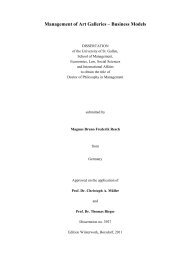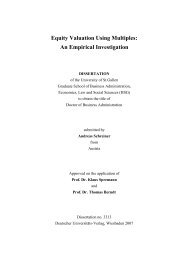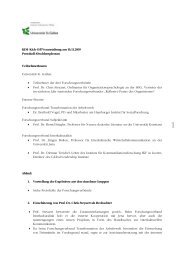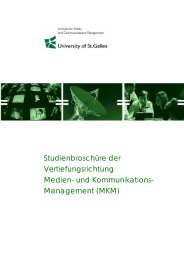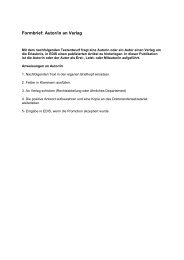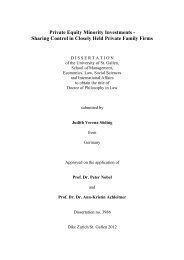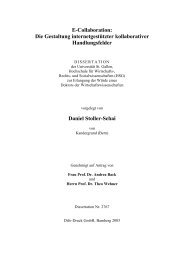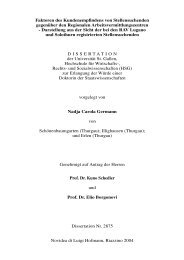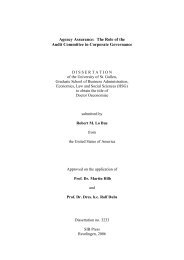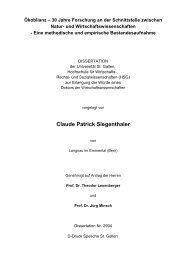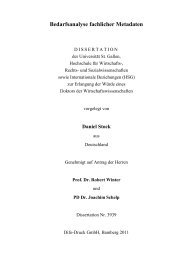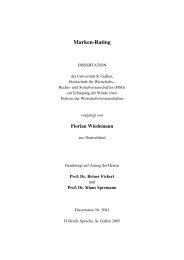The Impact of Direct Democracy on Society - Universität St.Gallen
The Impact of Direct Democracy on Society - Universität St.Gallen
The Impact of Direct Democracy on Society - Universität St.Gallen
- No tags were found...
You also want an ePaper? Increase the reach of your titles
YUMPU automatically turns print PDFs into web optimized ePapers that Google loves.
– 44 –4.2 Comments <strong>on</strong> the Changes in the Mandatory <strong>St</strong>atutory ReferendumBetween 1997 and 2003, a c<strong>on</strong>siderable c<strong>on</strong>stituti<strong>on</strong>al change regarding the mandatorystatutory referendum could be observed in Zürich: the mandatory statutory referendum wasabolished and a opti<strong>on</strong>al statutory referendum was introduced instead. This change becameeffective <strong>on</strong> the 1st <str<strong>on</strong>g>of</str<strong>on</strong>g> January, 1999. To evaluate how this change affects the index for thestatutory referendum, the interplay with the opti<strong>on</strong>al statutory referendum must be taken intoc<strong>on</strong>siderati<strong>on</strong> (see secti<strong>on</strong> 4.3), which caused a drop in the subindex <str<strong>on</strong>g>of</str<strong>on</strong>g> the statutoryreferendum (from 6 to 3.33). On the other hand, in 1999, an additi<strong>on</strong>al extraordinarymandatory referendum was introduced for laws and decrees (art. 30 bis, 1 and 3 CC).In cant<strong>on</strong> Bern, a restricti<strong>on</strong> with respect to extraordinary mandatory referendum wasintroduced in September 2002. Before this change any law could be subject to such anextraordinary referendum if 120 members (out <str<strong>on</strong>g>of</str<strong>on</strong>g> 200) <str<strong>on</strong>g>of</str<strong>on</strong>g> the Grosser Rat so decided (see T/S1999, p. 177). Now, however, it is stipulated that 100 members (out <str<strong>on</strong>g>of</str<strong>on</strong>g> 160, art. 72 CC) canput a law or decree <strong>on</strong> the ballot if it is subject to an opti<strong>on</strong>al referendum anyway according toart. 62. CC, to which all laws, internati<strong>on</strong>al treaties, and most decrees are subject. Exceptedare specific expenditure projects that are below the threshold for an opti<strong>on</strong>al fiscalreferendum. This change, however, did not affect the index <str<strong>on</strong>g>of</str<strong>on</strong>g> direct democracy because theextraordinary mandatory statutory referendum does not form part <str<strong>on</strong>g>of</str<strong>on</strong>g> it.In the cant<strong>on</strong> <str<strong>on</strong>g>of</str<strong>on</strong>g> Obwalden, the abolishment <str<strong>on</strong>g>of</str<strong>on</strong>g> the Landsgemeinde in 1998 led to a dramaticchange regarding the mandatory statutory referendum. Traditi<strong>on</strong>ally, before the popular vote<strong>on</strong> the 29th <str<strong>on</strong>g>of</str<strong>on</strong>g> November, 1998, the assembly <str<strong>on</strong>g>of</str<strong>on</strong>g> the cant<strong>on</strong>al electorate voted <strong>on</strong> all laws atthe ballot box (art. 65 old CC) and by open ballot in case <str<strong>on</strong>g>of</str<strong>on</strong>g> opti<strong>on</strong>al statutory referenda <strong>on</strong>decrees <str<strong>on</strong>g>of</str<strong>on</strong>g> the Kant<strong>on</strong>srat (art. 61 old CC). In the new partial revisi<strong>on</strong> <str<strong>on</strong>g>of</str<strong>on</strong>g> the c<strong>on</strong>stituti<strong>on</strong> <str<strong>on</strong>g>of</str<strong>on</strong>g>1998, this mandatory statutory referendum was eliminated and replaced by an opti<strong>on</strong>alstatutory referendum for laws (art. 59, 1 CC), and the old opti<strong>on</strong>al referendum <strong>on</strong> decrees wascompletely abolished 58 . According to the revised c<strong>on</strong>stituti<strong>on</strong>, a statutory initiative must bevoted up<strong>on</strong> if the Kant<strong>on</strong>srat does not agree or if it makes a counterproposal (art. 58 lit. cCC). According to art. 59, 2 lit. a, an extraordinary mandatory statutory referendum can beheld if a third <str<strong>on</strong>g>of</str<strong>on</strong>g> the members <str<strong>on</strong>g>of</str<strong>on</strong>g> the Kant<strong>on</strong>srat agree. This development led to a decline <str<strong>on</strong>g>of</str<strong>on</strong>g>the subindex <str<strong>on</strong>g>of</str<strong>on</strong>g> the statutory referendum in Obwalden from 6 in 1998 to 4.33 in 1999.58 Pers<strong>on</strong>al communicati<strong>on</strong> with Mr. DILLIER <str<strong>on</strong>g>of</str<strong>on</strong>g> the Rechtsdienst <str<strong>on</strong>g>of</str<strong>on</strong>g> Obwalden (24/08/2004).



